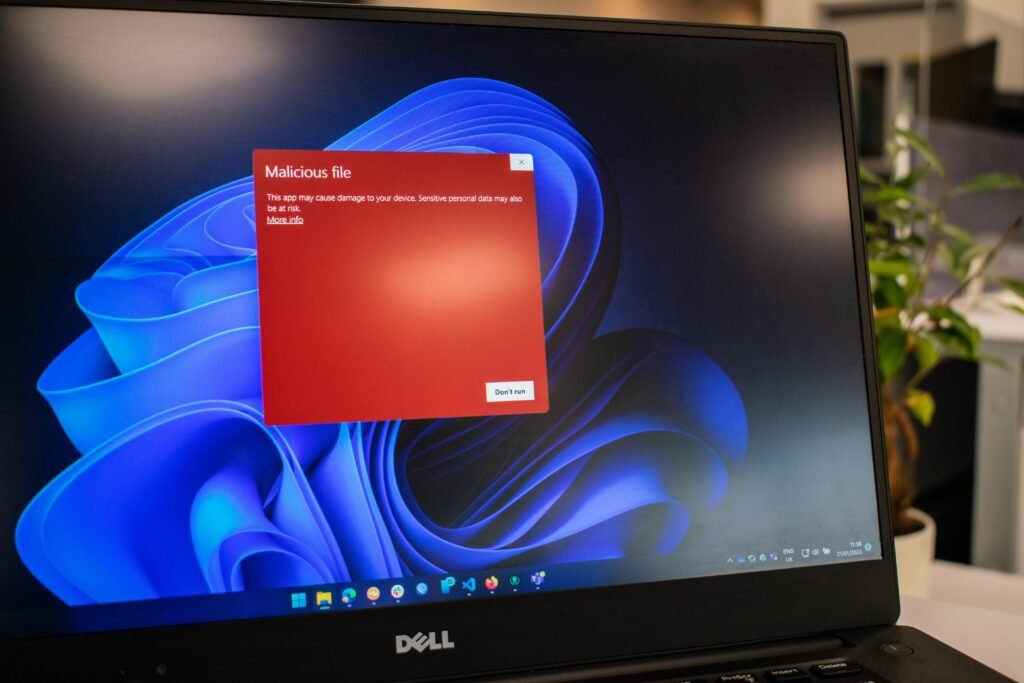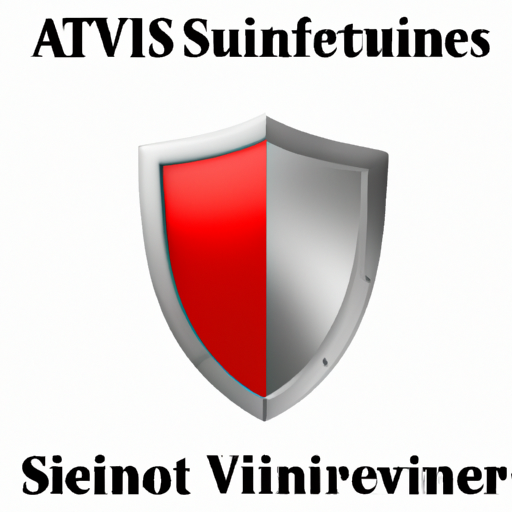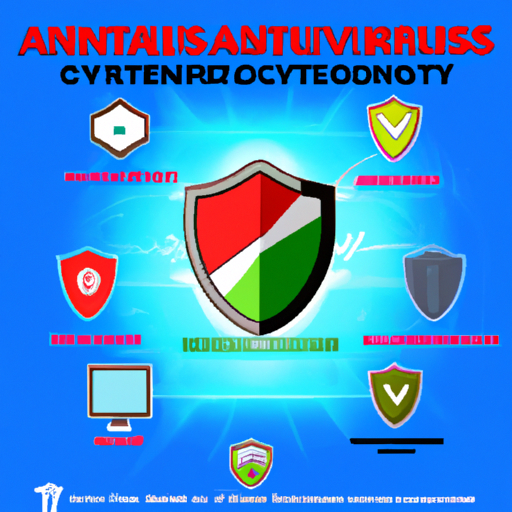If you’re in search of the best antivirus software to protect your computer, look no further. In this article, we’ll provide you with essential tips and information on finding the perfect antivirus software that suits your computer’s needs. Whether you’re a casual internet user or a business professional, choosing the right antivirus software is crucial to safeguarding your computer from viruses, malware, and other online threats. So, let’s dive in and discover the ideal antivirus software that will provide you with peace of mind and keep your computer secure.

Importance of Antivirus Software
In today’s digital age, the importance of antivirus software cannot be emphasized enough. With the increasing threat of malware and cyberattacks, protecting your computer and personal data has become a top priority. Antivirus software provides a crucial defense against malicious software, preventing unauthorized access, data loss, and potential damage to your computer’s performance.
Protection against malware
Malware, short for malicious software, is a significant threat to computer security. It includes viruses, worms, Trojans, spyware, and ransomware, among others. These malicious programs are designed to exploit vulnerabilities in your operating system or software, compromising your confidential information or even rendering your computer unusable.
By installing an antivirus software, you can protect your computer from these threats. Antivirus software continually scans your system for any suspicious files, quarantines or removes them, and prevents further infections. It acts as a powerful shield to block any potential threats from infiltrating your computer and compromising your data.
Prevention of data loss
One of the main concerns when it comes to computer security is the potential loss of valuable data. Whether it’s personal documents, precious photos, or important work files, losing them can be devastating. Viruses and other malware can corrupt or delete your files, resulting in permanent data loss.
Antivirus software plays a crucial role in preventing such data loss. It not only detects and removes malware but also safeguards your files from being tampered with or deleted. With real-time scanning and advanced threat detection capabilities, antivirus software ensures the integrity and safety of your data, providing you with peace of mind.
Enhanced computer performance
Another significant benefit of antivirus software is its ability to enhance your computer’s performance. Certain types of malware, such as adware and spyware, can significantly slow down your system, hogging resources and causing crashes or freezes. This can be frustrating and hinder your productivity.
By regularly scanning your computer, antivirus software identifies and removes these resource-hungry malware, freeing up your system resources. This results in a faster and more efficient computer, allowing you to work seamlessly without any performance issues. Antivirus software also optimizes your system by cleaning up unnecessary files, temporary internet files, and outdated software, further improving your computer’s speed and performance.
Factors to Consider
When choosing antivirus software for your computer, there are several factors you should take into consideration. Understanding these factors will help you make an informed decision and select the software that best fits your needs.
Operating system compatibility
Before selecting antivirus software, ensure that it is compatible with your operating system. Different software may have specific requirements or limitations regarding the operating system they can be installed on. Whether you have Windows, macOS, or Linux, make sure the antivirus software you choose is compatible with your system.
Resource usage
While antivirus software is essential, it should not bog down your computer’s performance. Some antivirus programs can be resource-intensive, consuming a significant amount of CPU power, memory, or storage space. This can lead to slower computer operations and impact your overall experience.
Consider the resource usage of the antivirus software you are considering. Look for lightweight options that strike a balance between providing comprehensive protection and not burdening your system resources.
Real-time protection
Real-time protection is a vital feature of antivirus software. It entails constant monitoring of your computer’s activities and incoming files, ensuring immediate detection and response to any potential threats. With real-time protection, the antivirus software can quickly quarantine or eliminate any malware before it can wreak havoc on your system.
Make sure the antivirus software you choose offers real-time protection. This feature is crucial in safeguarding your computer against new and emerging threats that may go undetected by traditional signature-based scans.
Pricing and subscription options
Antivirus software is available in both free and paid versions. Free antivirus software provides basic protection against malware but may lack advanced features available in paid versions. Paid antivirus software usually offers additional security features, customer support, and more frequent updates.
Consider your budget and the features you require when deciding between free and paid antivirus software. Look for subscription options that suit your needs, whether it’s an annual or monthly subscription. Many providers also offer multi-device licenses, allowing you to protect multiple computers or devices at a discounted price.
User interface
An intuitive and user-friendly interface is essential when choosing antivirus software. A cluttered or complicated interface can make it difficult to navigate and configure the software, causing frustration and confusion.
Look for antivirus software that offers a clean and easy-to-use interface. It should provide clear options and settings, making it simple for you to customize scans, modify settings, and access different features. A user-friendly interface ensures that you can effectively manage and utilize the antivirus software without any hassle.
Types of Antivirus Software
There are various types of antivirus software available, each with its own set of features and capabilities. Understanding the different types will help you determine which one best suits your needs.
Free Antivirus Software
Free antivirus software offers basic protection against common malware threats. It typically includes features such as real-time scanning, malware detection, and removal. While free antivirus software may lack some advanced features or additional layers of protection, it can still provide adequate security for everyday users.
Some popular free antivirus software options include Avast Free Antivirus, AVG AntiVirus FREE, and Microsoft Defender Antivirus (previously Windows Defender). These programs offer solid protection, regular updates, and user-friendly interfaces at no cost.
Paid Antivirus Software
Paid antivirus software offers advanced protection and additional features beyond what is available in free versions. These features may include firewall protection, email scanning, secure browsing, parental controls, and identity theft protection. Paid antivirus software is often recommended for those who require more comprehensive security and additional layers of defense.
Norton Antivirus Plus, McAfee Total Protection, and Bitdefender Antivirus Plus are well-known paid antivirus software providers. They offer robust protection, multiple device support, and a range of extra features to ensure the highest level of security.
Internet Security Suites
Internet security suites go a step further than traditional antivirus software by incorporating additional security measures. In addition to virus protection, they include features such as firewall protection, anti-phishing, anti-spam, and secure browsing capabilities. Internet security suites provide comprehensive protection against a wide range of cyber threats and are particularly suited for users who spend a significant amount of time online.
Some popular internet security suites include Kaspersky Internet Security, Avast Internet Security, and Trend Micro Maximum Security. These suites offer a holistic approach to online security, protecting your computer and personal data from various online threats.
All-in-one Security Software
All-in-one security software provides comprehensive protection by combining antivirus, internet security, and additional features into a single package. These software solutions are designed to cover all aspects of computer security in one application, simplifying the management and maintenance of your security measures.
Notable all-in-one security software includes Norton 360 Deluxe, McAfee Total Protection, and Avast Premium Security. These packages offer a comprehensive suite of security tools, including antivirus protection, firewall, secure VPN, identity theft protection, and much more.
Popular Antivirus Software
When it comes to antivirus software, several well-established and reputable providers stand out in the market. Each of these providers offers reliable and effective antivirus solutions, backed by years of experience and technical expertise.
Norton
Norton, developed by Symantec, is one of the most well-known and trusted names in the antivirus industry. With a range of antivirus and security products, including Norton Antivirus Plus and Norton 360 Deluxe, Norton provides robust protection against malware, ransomware, and other online threats. Norton’s software offers features such as real-time protection, smart firewall, secure VPN, and advanced threat protection.
McAfee
McAfee is another prominent antivirus software provider known for its comprehensive security solutions. McAfee offers a range of products catering to different user needs, from individual users to businesses. McAfee Total Protection provides advanced antivirus protection, secure browsing, identity theft protection, and a host of additional features. McAfee’s software emphasizes ease of use, comprehensive protection, and continuous threat intelligence updates.
Avast
Avast is a popular choice among users seeking reliable antivirus software. Avast offers both free and paid antivirus solutions, catering to different user requirements. Avast Free Antivirus provides essential protection against malware, while Avast Premium Security offers advanced features such as firewall protection, ransomware protection, and secure browsing. Avast’s software is known for its user-friendly interface, regular updates, and strong malware detection capabilities.
Bitdefender
Bitdefender is a trusted name in the antivirus industry, known for its powerful and efficient security solutions. Bitdefender offers a range of products, including Bitdefender Antivirus Plus, Bitdefender Internet Security, and Bitdefender Total Security. These products provide comprehensive protection against malware, ransomware, phishing attempts, and other online threats. Bitdefender’s software excels in malware detection and removal, system optimization, and seamless user experience.
Kaspersky
Kaspersky is a globally recognized antivirus software provider, focusing on delivering robust protection against cyber threats. Kaspersky offers a range of products, including Kaspersky Anti-Virus, Kaspersky Internet Security, and Kaspersky Total Security. These products feature advanced detection technologies, real-time protection, secure online transactions, and efficient malware removal. Kaspersky’s software is known for its exceptional malware detection rates, low system impact, and user-friendly interface.

Reviews and Ratings
To make an informed decision, it’s important to consider reviews and ratings of antivirus software. Reviews provide insights into the effectiveness, reliability, and user experience of different software options. Trusted sources and user ratings can help you gauge the quality and performance of antivirus software before making a purchase.
Comparing different software
Comparing different antivirus software options can be overwhelming, especially with the abundance of choices available. Expert reviews and comparisons can assist in understanding the strengths and weaknesses of each software. These comparisons often analyze factors such as malware detection rates, system impact, user interface, customer support, and additional features.
Websites like PCMag, TechRadar, and AV-TEST regularly publish detailed reviews and comparisons of antivirus software, providing comprehensive information to help you narrow down your choices. Exploring these reviews can give you a better understanding of each software’s effectiveness and suitability for your needs.
Trusted sources for reviews
When seeking unbiased and reliable reviews, it’s important to rely on trusted sources. Look for reviews from reputable technology websites, security experts, and industry publications. These sources conduct thorough evaluations of antivirus software and provide valuable insights based on their expertise and testing methodologies.
Popular technology websites such as CNET, Tom’s Guide, and Forbes often feature antivirus software reviews, giving you access to expert opinions and recommendations. It’s advisable to read reviews from multiple sources to get a balanced and comprehensive understanding of different software options.
User ratings and testimonials
In addition to expert reviews, user ratings and testimonials can provide valuable feedback on antivirus software. User reviews offer insights into real-world experiences and user satisfaction. By reading user reviews, you can gain a better understanding of the software’s performance, reliability, and ease of use from the perspective of actual users.
Platforms like Trustpilot, Capterra, and Software Advice host user-generated reviews and ratings for antivirus software. These platforms allow users to share their experiences, rate different aspects of the software, and provide feedback to help others make informed decisions. Consider both positive and negative reviews to form a comprehensive opinion on the software you are considering.
Choosing the Right Antivirus Software
When it comes to choosing the right antivirus software for your computer, several factors should be taken into account. Consider the following aspects to ensure that the software you select meets your specific requirements and provides optimal protection.
Identify your needs
Before selecting antivirus software, assess your specific needs and priorities. Determine the level of protection you require, the features that are important to you, and any specific requirements you may have. Consider factors such as whether you need protection for personal or business use, if you require additional security features like firewall protection or secure browsing, and the devices you need to protect.
Establishing your needs will help you narrow down your options and select antivirus software that aligns with your specific requirements, ensuring that you get the most out of the software you choose.
Consider computer specifications
Take into account the specifications of your computer or device when choosing antivirus software. Some software may have certain requirements regarding operating system versions, available storage space, or processing power. Ensure that your computer meets the minimum system requirements of the antivirus software you are interested in.
By considering your computer’s specifications, you can ensure compatibility and optimal performance. Choosing software that is well-suited to your system’s capabilities ensures that you can enjoy comprehensive protection without any negative impact on your computer’s performance.
Free trial options
Many antivirus software providers offer free trial options, allowing you to test the software before making a purchase. Free trials provide an opportunity to experience the software’s features, user interface, and performance firsthand. This trial period enables you to assess whether the software meets your expectations and suits your needs.
Take advantage of free trial options when available. During the trial period, evaluate the antivirus software’s effectiveness, ease of use, impact on system performance, and compatibility with your specific needs. This hands-on experience will help you make an informed decision and select software that delivers the level of protection and usability you require.
Customer support and reliability
Customer support and reliability are essential considerations when choosing antivirus software. In the event of any issues or concerns, prompt and effective customer support can make a significant difference. Look for software providers that offer reliable customer support channels, such as live chat, email, or phone support.
Additionally, consider the reputation and reliability of the software provider. Choose a provider that has a proven track record and positive feedback in terms of software updates, addressing vulnerabilities, and delivering ongoing protection against emerging threats.

Installation Process
Once you have selected the antivirus software that meets your requirements, it’s time to install and configure the software to ensure optimal protection. Following the proper installation process is crucial to ensure that the software functions correctly and provides comprehensive security.
System requirements
Before installing antivirus software, confirm that your computer meets the minimum system requirements specified by the software provider. Check the operating system version, available storage space, and any necessary software dependencies.
By meeting the system requirements, you can ensure that the software installation proceeds smoothly and without any compatibility issues. This ensures that the software functions optimally and delivers the intended level of protection.
Download and installation steps
To install the antivirus software, begin by visiting the official website of the software provider. Look for the option to download the software. It is advisable to download the software directly from the official website to ensure you are getting the legitimate and latest version.
Once the installer file has finished downloading, locate the file and double-click on it to start the installation process. Follow the on-screen instructions provided by the installer. Depending on the software, you may be prompted to review and accept the license agreement, select installation options, or customize settings.
During the installation process, the antivirus software may perform an initial scan of your computer to check for any existing malware. This scan helps ensure that your computer starts off on a clean slate with the new software in place.
Initial setup and configuration
After the installation is complete, you may be prompted to perform an initial setup and configuration. This setup typically involves creating or logging into an account associated with the antivirus software. Creating an account allows you to manage your subscription, access additional features, and receive updates or notifications from the software provider.
During the setup, you may be asked to customize certain settings, such as the scanning frequency, scan depth, or real-time protection options. Take the time to review these settings and adjust them according to your preferences and requirements.
It is important to ensure that automatic updates are enabled to keep the antivirus software up to date with the latest threat intelligence and security patches. Regular updates are crucial in maintaining the effectiveness and reliability of the software.
Updating and Scanning
After the installation and initial setup, it is imperative to keep your antivirus software updated and perform regular scans to ensure ongoing protection and detect any potential threats.
Automatic updates
Enabling automatic updates is essential to ensure that your antivirus software stays up to date with the latest virus definitions and security patches. Automatic updates allow the software to continuously evolve and adapt to new threats, ensuring the highest level of protection.
Check the settings of your antivirus software to ensure that automatic updates are enabled. If needed, you can specify the frequency or time of the updates. Regularly check for any available updates manually as well, especially if automatic updates are not supported by your software or if you suspect any connectivity issues.
Scanning schedules
Regularly scanning your computer is crucial to detect and eliminate any malware that may have evaded your antivirus software’s real-time protection. Set up scanning schedules that suit your usage patterns and ensure thorough scanning of your system.
Consider scheduling regular full system scans, which scan all files and folders on your computer, offering comprehensive protection. Additionally, you can schedule quick scans, which focus on common locations where malware is often found. By combining different scanning schedules, you can strike a balance between thorough protection and optimized system performance.
Options and customizations
Most antivirus software allows users to customize scanning options according to their individual needs and preferences. Take the time to explore the scanning settings and customize them based on your requirements.
Options may include the ability to exclude specific folders or files from scanning, select specific types of scans (such as quick scans or full scans), or specify actions to be taken upon detection of malware (such as quarantining, deleting, or ignoring).
By customizing the scanning options, you can tailor the antivirus software to your specific needs and ensure that it operates in a manner that aligns with your preferences and requirements.

Common Issues and Troubleshooting
While antivirus software provides essential protection, it is not immune to occasional issues. Understanding common problems and troubleshooting methods can help you resolve any issues effectively and ensure uninterrupted protection.
Compatibility problems
In some cases, antivirus software may encounter compatibility issues with other programs or software installed on your computer. These compatibility issues can result in software crashes, performance slowdowns, or conflicts that compromise the overall functionality of your system.
If you experience compatibility problems, try updating all installed software and drivers to their latest versions. Additionally, check the antivirus software’s official documentation or knowledge base for any specific compatibility recommendations or known issues.
If the compatibility issues persist, consider reaching out to the antivirus software’s customer support for guidance on resolving the specific problem you are facing.
False positives
Antivirus software occasionally flags legitimate files or applications as viruses or malware, resulting in false positives. False positives can occur due to an outdated virus database, aggressive scanning settings, or similarities between legitimate software and malware.
If you encounter a false positive, first ensure that your antivirus software is up to date with the latest virus definitions. This ensures that any known false positives have been addressed. If the false positive persists, you may need to add the flagged file or application to the antivirus software’s exclusion list, effectively bypassing it during future scans.
Always exercise caution when dealing with potential false positives. Thoroughly research the identified file or application to ensure its legitimacy before taking any exclusion measures.
Slow performance
While antivirus software aims to enhance computer performance, certain circumstances may result in temporary performance slowdowns. These slowdowns can occur during system scans, when performing resource-intensive tasks, or due to conflicts with other software or settings.
If you experience slow system performance, check the antivirus software’s settings for any customizable options related to system resource usage. Adjusting these settings can help strike a balance between thorough protection and optimized performance.
Consider scheduling scans during periods of low computer usage or outside of critical work hours. This minimizes the impact of scans on your system’s performance, allowing you to continue working without any significant slowdowns.
License activation issues
Occasionally, users may encounter issues with license activation or renewal when using paid antivirus software. These issues can include incorrect license keys, expired subscriptions, or problems with the license activation process.
If you encounter license activation issues, ensure that you have entered the correct license key. Double-check the key for any typos or mistakes. If the license key is correct and you are experiencing difficulties, contact the antivirus software’s customer support for further assistance.
Remember to keep track of your subscription dates and plan for renewal in advance. This ensures uninterrupted protection and avoids any potential gaps in security.
Additional Security Measures
In addition to antivirus software, there are other security measures you can consider to further enhance the safety of your computer and personal data. These measures provide additional layers of protection and mitigate potential risks.
Firewalls
Firewalls act as a barrier between your computer and potential threats from the internet or other networks. A firewall monitors incoming and outgoing network traffic, filtering out unauthorized connections and blocking potentially malicious activity.
Ensure that your computer’s operating system firewall is enabled. Additionally, consider using a hardware firewall or a third-party software firewall for additional protection. Firewalls work in conjunction with antivirus software to provide comprehensive network security.
Browser security extensions
Browser security extensions offer an extra layer of protection while browsing the internet. These extensions help detect and block malicious websites, phishing attempts, and dangerous downloads or extensions.
Popular browser security extensions include Norton Safe Web, McAfee WebAdvisor, and Bitdefender TrafficLight. These extensions provide real-time protection, warning you about potential threats before accessing websites or downloading files.
Consider installing a reputable browser security extension to enhance your online security and protect against various forms of cyber threats.
Backup solutions
Regularly backing up your important files is a crucial preventive measure against permanent data loss. In the event of a malware infection, hardware failure, or other unforeseen circumstances, having a backup ensures that you can restore your files and resume normal operations quickly.
Explore different backup solutions, such as cloud-based backup services or external hard drives. Set up a backup schedule that automatically and securely backs up your important files and folders. By implementing a reliable backup strategy, you can safeguard your valuable data and minimize the impact of any unforeseen events.
In conclusion, finding the perfect antivirus software for your computer requires careful consideration of various factors such as protection against malware, prevention of data loss, enhanced computer performance, operating system compatibility, resource usage, real-time protection, pricing and subscription options, and user interface. It is essential to conduct thorough research, read reviews, and consult trusted sources to make an informed decision. By choosing the right antivirus software, following proper installation and configuration procedures, and implementing additional security measures, you can ensure the highest level of protection for your computer and personal data.

